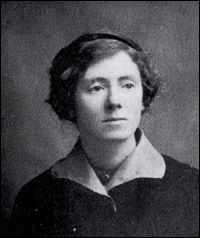Georgiana Cooper (1885-1980)
Personal Life
Harold Paddock said Georgiana Cooper “captured our soul in verse.” Georgiana Cooper did not become well known as a writer until she was in her eighties. Much of her renown stems from publication in The Newfoundland Quarterly by its former editor, Harry Cuff, who was also a former tenant at her boarding house. Cooper originated from Inglewood Forest, previously named Maggoty Cove, a small outport community estimated at seventeen people when she resided there. This population decreased to six in 1946 and was eventually abandoned in the 1950s. Her father, Thomas Henry Cooper and her mother, Roxana Stowe, settled at Inglewood in 1870, and later, in 1895, moved to Random Head, where her father took up a position as a lighthouse keeper.

Having been educated by a private governess in her youth and sent to schools at Deer Harbour and Thoroughfare, her family moved to St. John’s in 1905 and Cooper studied bookkeeping and business at the Convent of Our Lady of Mercy, eventually graduating as a nurse in 1920 from the General Hospital. She later became a nurse to Prime Minister Richard Squires and was also Superintendent of a 1919 convalescing nursing home for World War I servicemen.
When the nursing home closed, she moved to Boston in 1920 to pursue post-graduate studies in Nursing. She caught tuberculosis and returned to St. John’s, spending two winters convalescing at the Sanatorium, where she wrote many of her poems. By the 1930s, she convalesced at various friends’ homes in Topsail, Port Blanford and Wesleyville. She also became involved in the Newfoundland Arts Club, founded by A.C. Hunter, producing scores of watercolour painting. By the 1940s, she won first prize in the O’Leary Poetry Awards Contest for “The Deserted Island.” In her later years, she and her sister, Mina, operated a boarding house at 49 Parade Street, later moving to Cornwall Avenue and finally to St. Luke’s Home.
Technique and Spirituality
Like one of her favourite poets, the American Henry Wadsworth Longfellow (1807-1882), Cooper’s adoration of the beauty in nature predominantly centres on her experiences, memories and love of Inglewood Forest. Packed with spirituality, Cooper’s poems often highlight a presence of God in the world, mostly as manifestations of nature. It could be argued that Cooper’s sense of spirituality and God is linked to nature, sometimes referred to as Paganism, rather than more institutionalized forms of worship prevalent in Newfoundland, because it is more accepting and hospitable given the pitfalls of organized religion, which she brings to attention in “Denominationalism”:
Denominationalism
He goes from ward to ward solemnly, and with a reverent tread
One set apart—True priest of God most high
Bearing the “Sacred Elements”, or the Broken Bread
And Wine—His broken body and blood He shed—
Clothed in white vestments and in deep humility;
And in his downcast eye, and pitiful calm face
The image of the crucified and risen Lord I trace
And my heart pleads to mingle with his flock,
And eat and drink, my soul in hunger, he passes by.
He a good shepherd is, and herds his scattered flock
And strives to bring them safe within the fold.
But I am left to wander helplessly outside—hungry and cold.
Cooper’s spirituality, as seen in one of her poems, “Submission,” seems to focus on the fact that, for her, the majesty of nature creates a sense of submission, or humbleness, as it simultaneously creates assurance, and in this mixture there is to be found the presence of God.
Her verse also often captures a sense of a prevalent contradiction in Newfoundland’s history: passivity and pride. This sense of humbleness and confidence stems from Newfoundland’s history in battling adversity and hardship and its ability to withstand and overcome it. As such, the balance between serenity and harshness is commonly explored in her poetry. Above all, the aspects of Cooper’s poetry that are most relevant are the beautiful lines and images she conveys of Newfoundland traditions, from partridgeberry picking to caplin gathering. In this respect, she can be compared to the verse of Bertille Tobin, while her memories and longing for Inglewood Forest places her in a long line of Newfoundland authors who memorialize the places and traditions of the past.
Published Works
Her work has been printed in anthologies and school texts in Ontario, Manitoba, Newfoundland, Britain and the United States, as well as in Joseph Smallwood’s The Book of Newfoundland and Michael Harrington’s Poems of Newfoundland. The impressive profits from The Deserted Island formed the Georgiana Cooper Memorial Fund, a registered charitable organisation that aids students of Memorial University to study education at Memorial’s Harlow campus in England.
Excerpt from “The Deserted Island”
No nets spread out for mending
No hogsheads, puncheons, tubs, or barrels,
No boats, no chains, or anchors—
All away—
Only the patient, ageless,
Rock-bound shores
To which all waves come in
Like children, shouting, whispering, sobbing;
Only this remains.
Through tangled scrub,
Bracken and wild berries,
Past the blue flag and cotton grass, I go,
And there, close by the crest,
With tall monkshood standing by
And sunshine flooding,
I read their names,
Cut deep in marble, slab on slab.




